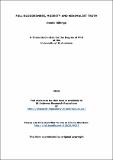Full-bloodedness, modesty and minimalist truth
Abstract
This thesis discusses the central ideas that surround Michael Dummett’s claim that there is an incompatibility between a truth-conditional conception of meaning and a minimalist conception of truth. These ideas are brought into relation to the work of John McDowell and Donald Davidson, as all three philosophers can be better understood by locating them within Dummett’s dialectic regarding the incompatibility. Dummett’s argument crucially depends upon the assumption that a meaning-theory should be full-blooded in nature, against McDowell’s insistence that a meaning-theory can only ever be modest. The main contention of this thesis is that neither Dummett nor McDowell is successful in establishing their strong contentions regarding the form that a meaning-theory should take. McDowell only wants to provide trivial answers to questions about the constitutive nature of the meanings and competency of particular items in a language. Dummett, on the other hand, wants to provide a reductive account of the central concepts that concern the philosophy of language. What this thesis will argue is that once both of these claims have been rejected, the position Dummett and McDowell jointly dictate is in fact the position that we should read Davidson as occupying, who lies in a conceptual space between the extremes of maximal full-bloodedness and modesty. This is an understanding of Davidson that is contrary to how McDowell reads him, who has been an influential commentator of Davidson. How Davidson should actually be interpreted is achieved by understanding how he has the resources to avoid Dummett’s claim of an incompatibility between a truth-conditional conception of meaning and a minimalist conception of truth.
Type
Thesis, PhD Doctor of Philosophy
Collections
Items in the St Andrews Research Repository are protected by copyright, with all rights reserved, unless otherwise indicated.

